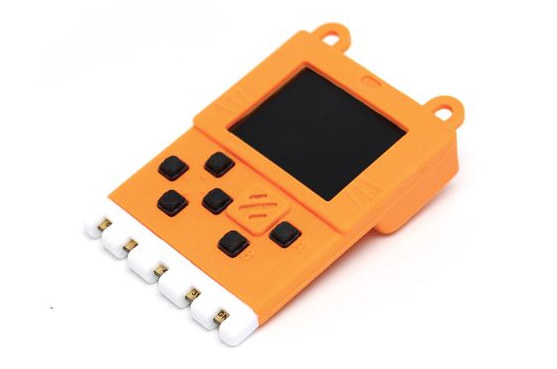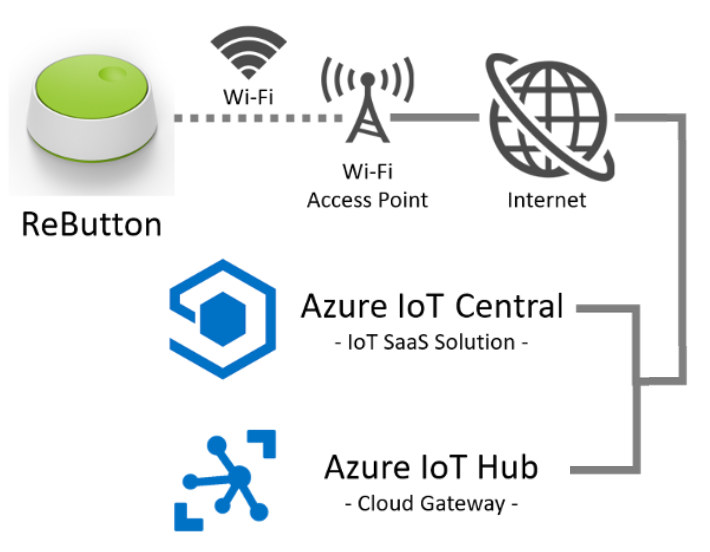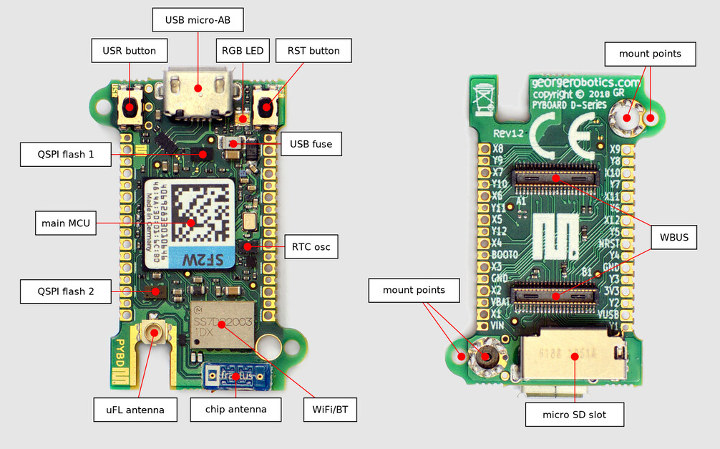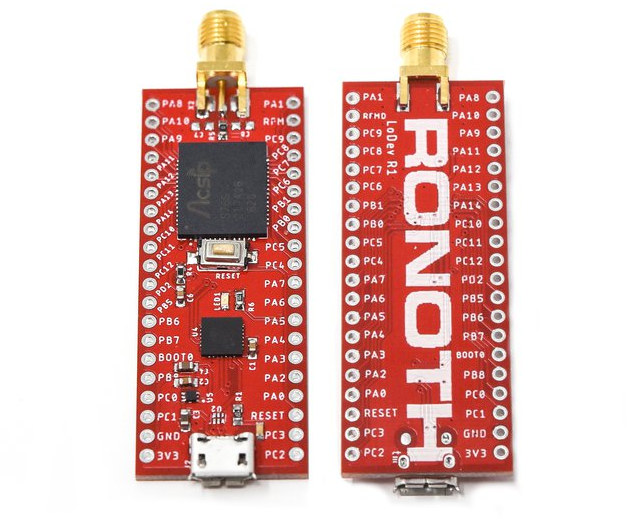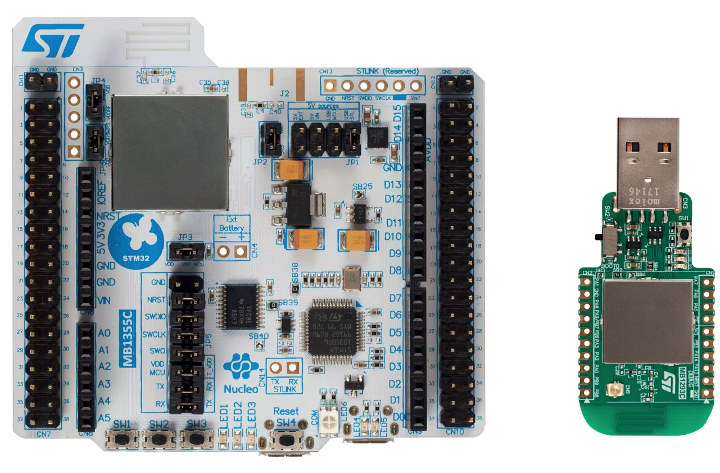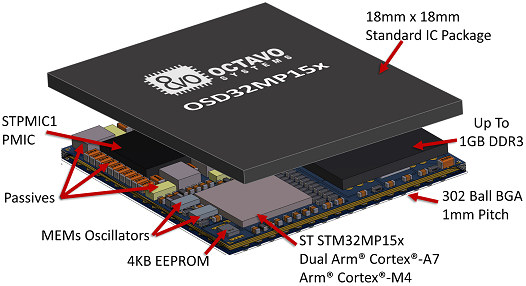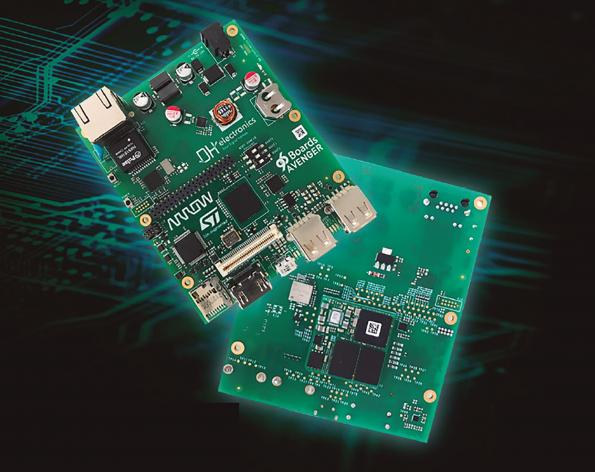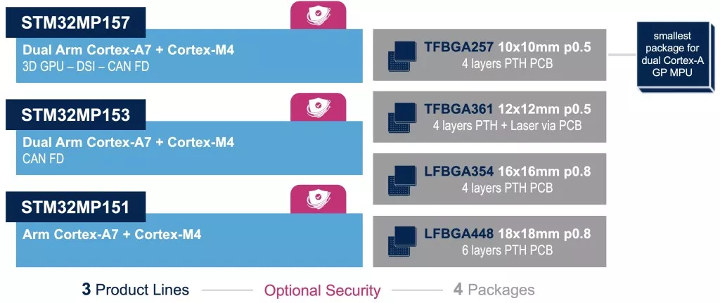At first glance, Kittenbot Meowbit gaming console looks like a kid’s toy, but it’s bit more than that as its STM32 MCU can be programmed with MakeCode arcade, Scratch3.0 based Kittenblock, or MicroPython, and features the same edge connector as found in BBC Micro:bit board, and as such is compatible with several Micro:bit accessories. Kittenbot Meowbit specifications: MCU – STMicro STM32F401RET6 Arm Cortex M4 micro-controller Storage 2MB SPI flash to store Unicode character table (default) SD card slot to store programs or extend wireless modules Display – 160 x 128 full-color TFT LCD Sensor – Light sensor, temperature sensor, MP6050 gyroscope USB – 1x micro USB port for power and programming Expansion – 40-pin BBC Micro:bit “goldfinger” connector Misc – Charging/work LED, 2x user LED, power switch, reset button, DFU mode button, 4x direction buttons, A/B buttons, buzzer, multiplayer connector (15) Power Supply – 5V via USB, or 3.7~4.2V via […]
ReButton WiFi Button Features MXCHIP EMW3166 Module
We’ve previously covered WiFi buttons based on ESP8266 processor, but Seeed Studio has just launched ReButton “developer device” that serves the same purpose but features STM32 based MXCHIP EMW3166 WiFi module instead, exposes one I2C grove connector, and is preloaded with sample firmware that triggers Azure IoT Central or Azure IoT Hub. ReButton hardware specifications: MCU module – MXCHIP EMW3166 module including STM32F412 Arm Cortex M4F MCU @ 100 MHz with 256KB SRAM, 1MB+2MB SPI Flash, and Cypress BCM43362 WiFi chip Input – 1x Push button Output – 1x RGB LED Extension – 1x I2C Grove connector (3.3V I/O) Debugging – 1x SWD pads, 1x UART for debugging Misc – 1x Jumper switch Power supply 2x AAA Alkaline batteries (LR03) Internal supply voltage – 3.3V Dimensions – 70 x 70 x 25mm The ReButton comes preloaded with an Arduino sketch that handle key presses and send a trigger to Azure […]
Pyboard D-series Wireless Micropython Boards Launched for $56 and Up
We’ve already mentioned the latest Pyboard D-series board at the beginning of February after it was introduced at FOSDEM 2019. The board comes with a powerful STM32F7 Arm Cortex-M7 microcontroller, as well as a WiFi and Bluetooth wireless module. The news is that the board has now launched for £43.80 in.c VAT ($56) and up. A better price comparison with other boards is normally achieved by comparing the ex. VAT price of £36.50 or about $48. That may still feel a bit pricey to some, but there was enough interest to snatch all available “PYBD-SF2-W4F2” boards, and this specific board is out of stock at the time of writing. However, there are multiple variants of the board and PYBD-SF3-W4F2 is still in stock for £58.20 inc. VAT (~$76.5). We’ve now got the full Pyboard D-series “PYBD-SF2-W4F2” specifications: MCU – STMicro STM32F722IEK Arm Cortex M7 microcontroller at 216 MHz with 256KB […]
LoDev S76S Board Combines STM32, LoRa and Arm Mbed Support (Crowdfunding)
There are already plenty of low power boards with a LoRa radio, but Ronoth offers another option with their tiny LoDev S76S LoRa development board featuring AcSip S76S SiP (system-in-package) with STMicro STM32L073 microcontroller, a Semtech SX1276 LoRa radio, and other components. While most hobbyist LoRa boards are designed to be programmed with the Arduino IDE, LoDev S76S is instead compatible with Arm Mbed. LoDev S76S board specifications: SiP – AcSip S76S system-in-package with STMicro STM32L073 Arm Cortex-M0+ microcontroller @ 48 MHz with 192 kB flash, 20 kB RAM Semtech SX1276 chip supporting global 863MHz ~ 928MHz ISM Bands RF front-end LoRa Connectivity Receiver Sensitivity – down to -146 dBm TX Power – adjustable up to +20 dBm Range – up to 15 km coverage in suburban areas and up to 5 km coverage in urban areas SMA antenna connector USB – 1x micro USB port for programming and power […]
STMicro Launches STM32WB55 Bluetooth 5 and 802.15.4 MCU & Nucleo Pack
STMicro unveiled their first STM32 Wireless MCU family at Embedded World 2018 last year with STM32WB dual-core Cortex-M4/M0+ microcontroller equipped with Bluetooth 5 and 802.15.4 radios, but it was only this year at Embedded World 2019 that the company announced commercial availability of STM32WB55 family as well as the P-NUCLEO-WB55 development pack containing a classical Nucleo 64 board and a USB dongle. STMicro STM32WB55 Bluetooth 5 & 802.15.4 MCU Key features and specifications: Application Core – Arm Cortex-M4 CPU @ up to 64 MHz with FPU, adaptive real-time accelerator (ART Accelerator), MPU, 80 DMIPS and DSP instructions Memory – Up to 256 KB RAM, including 64 KB with hardware parity check, 20×32-bit Backup Register Storage Up to 1 MB Flash with sector protection (PCROP) against R/W operations for Bluetooth Low Energy and 802.15.4 SW stack Quad SPI memory interface with XIP Radio 2.4 GHz RF transceiver supporting Bluetooth 5 and […]
Octavo Systems Unveils OSD32MP15x STM32MP1 SiP (System-in-Package)
STMicro STM32MP1 is one of the most interesting microprocessor recently announced, as it should allow a relatively easy upgrade path for projects based on the traditional STM32 Cortex-M4 microcontrollers, thanks to backward compatibility, and the extra one or two Arm Cortex-A7 cores enabling Linux support. We’ve already seen several upcoming evaluation and development boards based on STM32MP157 processor including STMicro’s own discovery kits and evaluation platform, as well as Arrow Electronics Avenger96 board fitted with a tiny 29x29mm SoM. But I suspect we could see even more compact designs soon, as Octavo Systems has now unveiled OSD32MP15x system-in-package with STM32MP15x MPU, up to 1GB RAM, 4K EEPROM, STPMIC1 power management IC, two oscillators, and over 100 passive components all brought together into a 18x18mm package. Octavo Systems OSD32MP15x system-in-package main components and specifications: MPU (MicroProcessor Unit) – STMicroelectronics STM32MP15x with Dual Arm Cortex-A7 @ 650MHz, Arm Cortex-M4 real-time core @ […]
Avenger96 96Boards CE Extended Board Features an STMicro STM32MP1 SoM
STMicro unveiled the first STM32 microprocessor – as opposed to microcontroller – earlier this week with STM32MP1 adding one or two Cortex-A7 cores running Linux to the Cortex-M4F core usually found in STM32 microcontrollers. The company also announced their own evaluation kits and discovery kits but promised a 96boards compliant board and system-on-module would be showcased at Embedded World 2019. But Arrow Electronics has already released some limited information about a 96boards CE extended compliant STM32MP1 powered SBC called Avenger96 and that happens to be designed with a baseboard and an STM32MP157 system-on-module. Avenger96 preliminary specifications: SoC – STMicro STM32MP157 dual Arm Cortex-A7 processor @ 650MHz, Arm Cortex-M4 @ 209MHz, 3D GPU Vivante @ 533MHz with OpenGL ES 2.0 support System Memory – 1GB DRAM DDR3L @ 533MHz Storage – 8GB eMMC flash, 2MB flash, micro SD socket Video Output – HDMI 1.4 (Analog ADV7513 transceiver) Networking – Gigabit Ethernet, […]
STMicro STM32MP1 Cortex A7/M4 MPU Supports Linux and Android
When Linux 4.17 was released last June, we discovered an interesting new STM32 part: STM32MP157C dual core Cortex-A7 processor. It was the first time I saw an STM32 IC not based on Arm Cortex-M microcontroller core, but we knew only very little details at the time. STMicro has now made it official, and introduced STM32MP1, the first STM32 MPU (Microprocessor Unit) that features one or two Arm Cortex-A7 cores running Linux, as well as an Arm Cortex-M4 real-time core that allows to re-use code from existing STM32 projects. STM32MP1 key features and specifications: Cores Single or Dual Cortex-A7 core(s) running at 650 MHz with 32-Kbyte L1 Instruction cache, 32-Kbyte L1 Data cache, 256-Kbyte Level 2 cache Cortex-M4 core running at 209 MHz with single-precision floating point unit (FPU), digital signal processor (DSP) instructions, and memory protection unit (MPU) GPU (STM32MP157 only) – Vivante 3D GPU with OpenGL ES 2.0 support; […]


